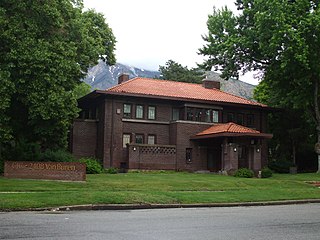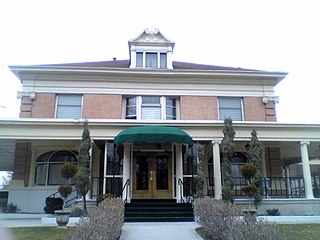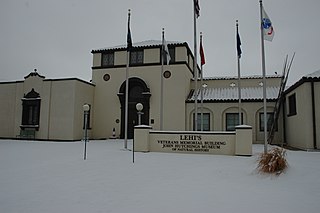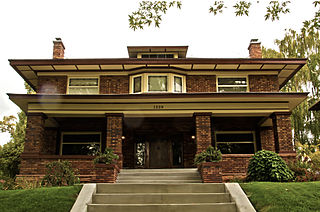
Eccles Avenue Historic District, also known as the David Eccles Subdivision, is a historic neighborhood located between 25th and 26th streets and Jackson and Van Buren Avenues in Ogden, Utah, United States. It was listed on the National Register of Historic Places in 1976.

The Gustav Becker House is located at 2408 Van Buren Avenue, in Ogden, Utah, United States. It was built around 1915 based on Frank Lloyd Wright's "A Fireproof House for $5,000" published in Ladies' Home Journal in April 1907. It was designed in detail by Salt Lake architects Ware & Treganza.

The Warenski-Duvall Commercial Building and Apartments, built in 1915, is a two-story brick, two part commercial block that is listed in National Register of Historic Places. The building is significant for its role in the early urbanization of Murray, Utah. The Warenski-Duvall building represents a building-type common during the early-twentieth century development of Murray's commercial business district and it is also part of the Murray Downtown Historic District. The building's owner was Edward J. Warenski, an early resident of Murray who owned a saloon and grocery store on State Street. Warenski and his family lived just north of the store. In 1923, the Duvall family purchased the building and divided the upper floor into apartments where family members and other workers in downtown Murray lived.
Ware & Treganza was a leading American architectural firm in the intermountain west during the late 19th and early 20th century. It was a partnership of Walter E. Ware and Alberto O. Treganza and operated in Salt Lake City, Utah.

The Jesse Knight House, also known as the Knight Mansion, is a historic house in Provo, Utah, United States built for Jesse Knight. It was built in 1905, and added to the National Register of Historic Places in 1982. This home was designated to the Provo City Historic Landmarks Register on June 19, 1996.

The Startup Candy Company is the oldest candy company in Utah and one of the oldest candy companies in the United States. William Startup started making candy in his basement in Manchester, England in 1820. He developed the first hard candy and called it “American Cough Candy” because he hoped to bring his new recipe to America one day. However, William died before making it to America, but he left his legacy to his son and namesake. William Startup Jr. learned the candy-making process as a young boy and continued to run his father’s candy business.

The Provo Downtown Historic District is a 25-acre (10 ha) historic area located in Provo, Utah, United States. It is listed on the National Register of Historic Places.
Alberto Owen Treganza, sometimes known as Albert Treganza or A.O. Treganza, was an American architect and ornithologist in the early 20th century.
Walter Ellsworth Ware was an American architect who established a firm in 1891 in Salt Lake City, Utah and practiced until 1949, over a period of almost 60 years. He designed numerous buildings of diverse styles and functions that remain standing, many of which are listed on the U.S. National Register of Historic Places.

The Lehi City Hall at 51 N. Center St. in Lehi, Utah, known also as Old Lehi City Hall, was built during 1918–1926. It was designed by architects Walter E. Ware and Alberto O. Treganza of Salt Lake City and is of Mission/Spanish Revival style.

The Almon A. Covey House is a historic house in northeastern Salt Lake City, Utah, United States, that is located within the University Neighborhood Historic District, but is individually listed on the National Register of Historic Places (NRHP).

The Hyrum T. Covey House is a historic house in northeastern Salt Lake City, Utah, United States, that is located within the University Neighborhood Historic District, but is individually listed on the National Register of Historic Places (NRHP).

The Ladies Literary Club Clubhouse, at 850 East South Temple St. in Salt Lake City, Utah, was built in 1913. It was designed by architects Treganza & Ware in Prairie School style.

The J.G. McDonald Chocolate Company Building in Salt Lake City, Utah, United States, is a 4-story commercial structure designed by John A. Headlund and completed in 1901. The original 3-story brick and stone building was expanded to four stories soon after construction, and it continued to expand as the company grew. The building was added to the National Register of Historic Places in 1978, and it is now included in the Warehouse District.

The Mount Pleasant Carnegie Library, at 24 E. Main St. in Mount Pleasant, Utah, was built as a Carnegie library in 1917. It was listed on the National Register of Historic Places in 1984.
The University Neighborhood Historic District is a 180 acres (73 ha) historic district near the University of Utah campus in northeastern Salt Lake City, Utah, United States, that was listed on the National Register of Historic Places in 1995.
The Morton A. Cheesman House, at 2320 Walker Lane in what is now Holladay, Utah, was built in 1912–13. It was listed on the National Register of Historic Places in 1982.

Smith Apartments is a historic three-story building in Salt Lake City, Utah. It was built as a U-shaped residential building by Andrew and James E. McDonald in 1908, and designed in the Prairie School style by architects Walter E. Ware and Alberto O. Treganza. It belonged to David Smith, a rancher from Idaho, until 1944, when it was acquired by the Riverton Motor Company. It has been listed on the National Register of Historic Places since October 20, 1989.
The Ross Hame, at 4769 S Holladay Blvd. in Holladay, Utah, also known as the William Harvey and Sarah Seegmiller Ross House, was built in 1922–23. It was listed on the National Register of Historic Places in 2018. The listing included two contributing buildings, a contributing structure, and a non-contributing building, on 1.35 acres (0.55 ha).
















